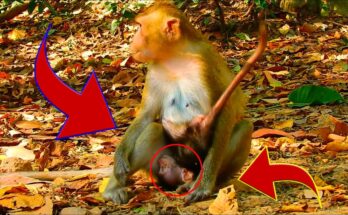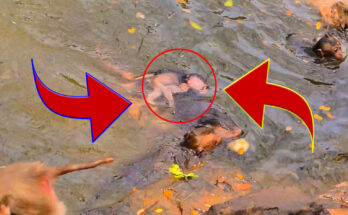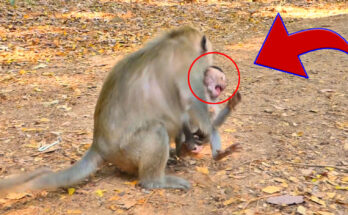In the dense forests of the jungle, where the air is thick with the songs of birds and the rustle of leaves, one story has emerged that is as chaotic as it is heart-wrenching. The tale of Malika, the mother monkey, has shaken the animal world, creating ripples of awe and concern. Malika’s behavior has become a topic of fascination, drawing the attention of wildlife experts and animal lovers alike. The story begins with a moment of unimaginable tragedy, followed by an astonishing display of maternal devotion, revealing the fierce, sometimes unpredictable nature of animal instincts.
Malika, a mother to a young baby monkey, had always been a caring and attentive parent. Her love for her child was evident in the way she groomed her baby, fed it, and kept it close at all times. But one fateful day, while the monkeys were playing near the edge of a river, a disaster struck. Malika’s baby, who was still small and uncoordinated, slipped and fell into the water. The current was strong, and the little one, caught off guard, was carried away swiftly.
The sight of her unconscious baby being pulled down the river was more than Malika could handle. Her heart raced, and her mind, filled with panic, seemed to lose all sense of control. The jungle fell silent as Malika’s anguished cries echoed through the trees. Her instincts, however, kicked in, and without a moment’s hesitation, she leaped into the river after her baby.
Despite her speed and determination, the current was unforgiving. Malika fought against it, her fur matted down with water, as she struggled to reach the lifeless form of her baby. She was frantic, her actions erratic, as she snatched at branches, rocks, and anything she could grab to pull herself closer to her child. The other monkeys in the area, too, watched in horror, but none dared to intervene. They could see that Malika was beyond reason—she was no longer just a mother; she had become an unstoppable force driven by pure survival instinct.
By the time she reached her baby, Malika’s strength had all but dissipated. But she wasn’t ready to give up. With one final surge of energy, she clutched her baby’s body tightly and made her way back to shore, dragging the little one to safety. Panting and exhausted, Malika collapsed onto the bank, her eyes never leaving her unconscious child. She gently cradled her baby in her arms, rocking back and forth, as if trying to revive it with sheer willpower alone.
For hours, Malika did not leave her baby’s side. Her frantic behavior only intensified as time passed. The other monkeys began to murmur amongst themselves, some suggesting they seek help from the nearby human settlements. However, Malika was resolute. She was no longer just the calm, collected mother they had known. In this moment, she had transformed into a frantic, desperate being—her wild eyes and trembling body a testament to her unyielding determination to save her baby.
Finally, after what felt like an eternity, Malika’s baby stirred. A soft whimper broke the silence, and the baby monkey opened its eyes, blinking in confusion. The mother’s relief was palpable. She kissed her baby’s forehead, her cries of joy echoing through the forest. What had started as a chaotic, almost insane display of desperation had ended in a miraculous recovery.
Malika, though exhausted and shaken, had saved her baby. Her actions, though irrational and extreme, highlighted a fundamental truth about the fierce protective instincts of mothers. The transformation of Malika from a calm, loving parent to a crazed and wild creature is a reminder that even in the most chaotic moments, survival and love can drive beings to do the unthinkable.
In the aftermath, Malika’s story spread quickly, and the animal world marveled at her devotion. Wildlife enthusiasts described her as “the craziest monkey” now, a title that both encapsulates her wild, frantic behavior and the profound love that fueled it. Her tale serves as a testament to the lengths a mother will go to when her child’s life is at stake, and how, even in moments of crisis, the primal instincts of love and protection can take over in the most surprising ways.


